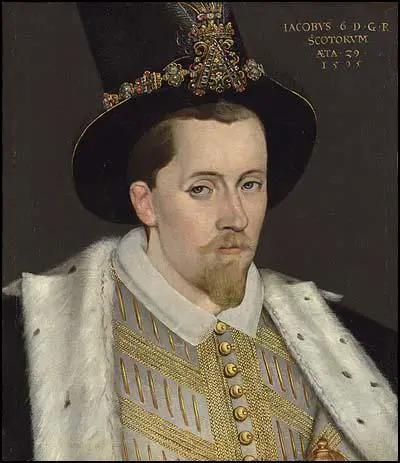Divine Right of Kings
In 1597 James VI of Scotland began work on Basilikon Doron. This manual on the powers of a king, was written in the form of a letter to his four-year old son, Henry Frederick. This document provides general guidelines to follow to be a good monarch. James argues that a king should govern with justice and equality. He should also invite foreign merchants into the country and base the currency on gold and silver to help the economy grow. James also stated that to be a good monarch he must be well acquainted with his subjects and therefore it would be wise to visit all kingdoms every three years. He also told his son that he should choose a wife that shared the same religion. (1)
James used this document to reinforce the idea that kings were appointed by God and ruled in his name. The Divine Rights of Kings theory had been developed by the French philosopher, Jean Bodin in his book, The Six Books of the Republic (1576). Although he was a Roman Catholic he was critical of papal authority over governments and argued that this abuse of power had helped produce the Protestant Reformation. Bodin believed that the strong central control of a national monarchy would reduce religious conflict. (2)

James explored this idea in more detail in The True Law of Free Monarchies (1598). He rejected the idea that Pope Clement VIII should have any power over his government. James claimed that "kings are justly called gods, for that they exercise a manner or resemblance of divine power upon earth... They make and unmake their subjects; they have power of raising and casting down, of life and of death, judges over all their subjects and yet accountable to none but God only." (3)
In 1633 King Charles I appointed William Laud, as the Archbishop of Canterbury. "In his sermons at court and before parliament he had painted an image of church and state working in harmony, and the essence of his ecclesiastical policy was to oversee a strengthening of the powers of the church which would as a consequence reinforce ties of deference within society, as well as providing the crown with enhanced support independent of parliament." (4) Laud also argued that the king ruled by Divine Right. (4) He claimed that the king had been appointed by God and people who disagreed with him were bad Christians. (5)
Primary Sources
(1) King James I, speech in Parliament (1610)
Kings are justly called gods, for that they exercise a manner or resemblance of divine power upon earth ... They make and unmake their subjects; they have power of raising and casting down, of life and of death, judges over all their subjects and yet accountable to none but God only.
(2) Roger Lockyer, Tudor and Stuart Britain (1985)
As King of Scotland, James had come into conflict with the more extreme presbyterians, who maintained that the Church was entirely separate from the state and that the secular ruler had no authority over it. And, from the other end of the religious spectrum, he had been reminded by Roman Catholics that all earthly sovereigns were subordinate to God and therefore to God's deputy on earth, the Pope. James countered these implicit threats to his independence by asserting the divine origin of kingly authority and in his writings as in his speeches he consciously and deliberately exalted monarchical power.
There was nothing new in James's belief that kings were appointed by God and ruled in His name. The "godly prince" had been the Reformation's substitute for papal authority, and Elizabeth, no less than James, had taken it for granted that her office was of divine origin.... James's insistence on his divine right to rule seemed to imply that the liberties of his subjects only existed upon sufferance, and this was something which the political nation, the propertied section of English society, would never accept.
